Podcast: Play in new window | Download
Subscribe: Apple Podcasts | Android | Email | Google Podcasts | Stitcher | TuneIn | Spotify | RSS
The past year has brought many new folks into the realm of self-liberation; and, since vonu is still technically considered in it’s revival stages, I figured I would put together this short Vonu Beginner’s Guide to jumpstart your journey into your liberated lifestyle of choice.
[Click here to download this Vonu Beginner’s Guide in PDF format.]
For more references, information, or content, follow the links within the article, or just head on over to the podcast archives…that is the best place to start, after all.
THE VONU BEGINNER’S GUIDE
To a newly initiated freedom seeker, it could appear that there are endless problems/grievances in the modern world and few solutions, especially after the past 300 or so days. And in the nonsensical, coercion-ruled servile society, the touted “solutions” always strangely seem to be far worse than the “problems” they are alleged attempts to solve – whether it’s a fake/overblown “virus” (whatever your position or the whole truth may be, there’s plenty of evidence for both), the hyperinflation/ensuing manufactured collapse from adding trillions upon trillions of fake dollars to the fake debt for “stimulus”, or even just good ol’, non-conspiratorial blowback from destroying lives and families overseas in, again, a largely constructed, yet deadly dangerous “game” of mass murder more commonly known as “foreign policy.”
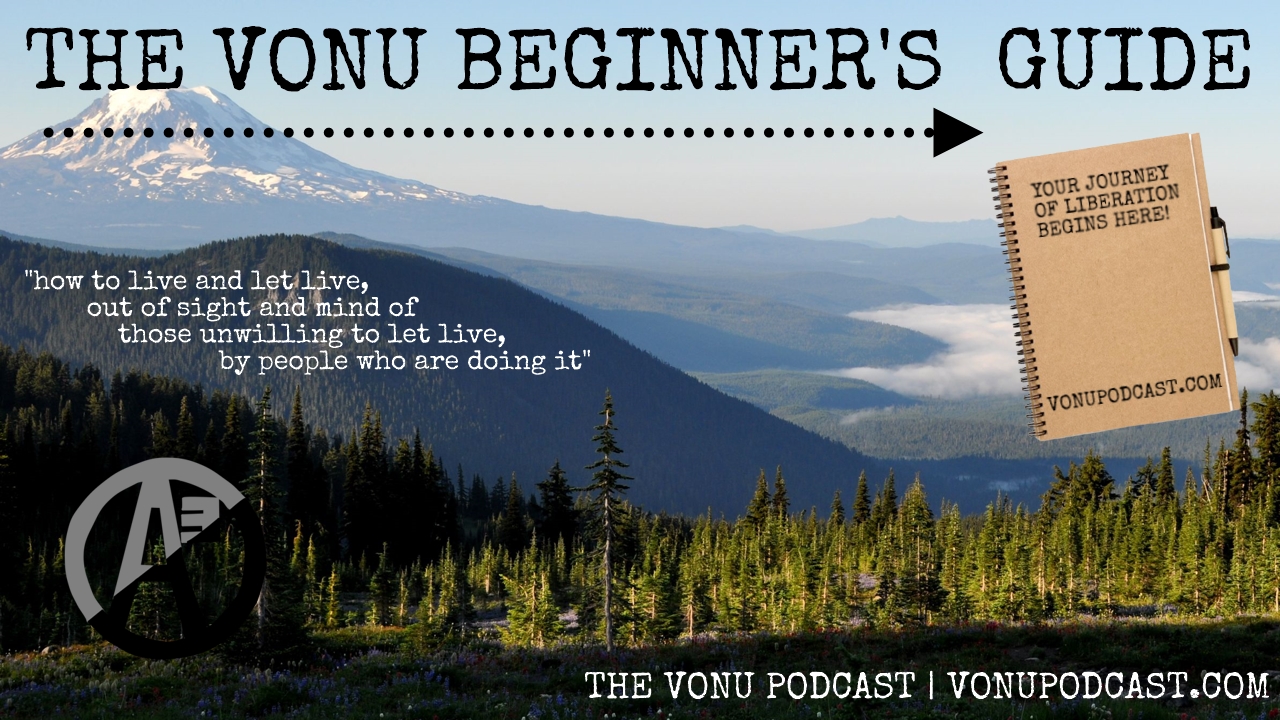
Clearly, while this somewhat defeatist position is understandable, it’s not an accurate representation of reality. Believe it or not, you have a lot more power and control than you may realize – and there are a number of strategies and methodologies available that could be of assistance in your pursuit of self-liberation. Yes, some sacrifices in convenience and other things will probably have to be made. It may not always be easy, and in fact, it may be extremely difficult at times. But with this introductory guide at hand, your pursuit of vonu (or freedom more generally) will be made much easier.
In this Vonu Beginner’s Guide, I will:
- Define necessary terms & introduce you to various lifestyle changes in pursuit of vonu;
- Provide you with an introduction to the founder/main proponent of this freedom strategy (Rayo);
- Tell you why vonu matters;
- Then, I’ll cover Rayo’s concept of ethical enclave trading which actually predates agorism;
- F.A.Q. (Common Confusions List);
- Next steps & pointers on where to learn more.
In other words, to quote Rayo:
Now that a collective-movementism (also called bullshit libertarianism and political crusading) has been discredited as a liberation strategy, it is appropriate to re-examine strategies which treat freedom as an individually-achievable way-of-life and marketable commodity.
Onward to solutions…your liberated lifestyle is closer than you think.
~~~
DEFINING OUR TERMS…
A couple of the most critical words to define in this realm are “self-liberation” and “vonu”.
Firstly, self-liberation is the constant action of shedding that which enslaves and restricts, while simultaneously building and creating an environment in which freedom can thrive. Self-liberation deals with all realms of the human experience, whether mental, physical, or spiritual. A self-liberator, then, is the forward-thinking individual, the creative generative force which brings areas of autonomy and liberation into fruition (in anarchist/agorist circles, these areas of autonomy are colloquially known as temporary autonomous zones, Second Realms, ethical enclaves, agoras, etc.).
Vonu is the condition or quality of, as well as the action of achieving, an invulnerability to coercion. Etymologically, it is an awkward contraction of the phrase, VOluntary Not vUlnerable (hence, “vonu”), and practically, it’s the adoption of lifestyle changes in pursuance of said invulnerability to coercion. These include (but are not limited to):
- Ethical enclave trading (the precursor to agorism, more below)
- Off-grid homesteading
- Van nomadism
- Crypto-anarchy (crypto-currencies, encryption, mesh networking, etc.)
- Perpetual traveling/strategic relocation
- Entrepreneurship/financially independent early retirement
- Wilderness vonu
- Vonu in cities
- And more…
~~~
Grammatical Variations of “Vonu” Defined:
Vonu: the condition or quality of, as well as the action of achieving, an invulnerability to coercion.
Vonuer: having comparatively more an invulnerability to coercion.
Vonuence: in the process of achieving an invulnerability to coercion.
Vonuan: one who has an invulnerability to coercion.
Vonuist: one who advocates for an invulnerability to coercion.
Vonuism: the advocacy of an invulnerability to coercion.
Vonuum: the place or situation of an invulnerability to coercion.
Vonumy: the art of achieving an invulnerability to coercion.
Vonumer: one skilled at an invulnerability to coercion.
~~~
EL RAYO: THE FIRST VONUAN…
Back in the 1960s, a man named Tom Marshall (“Rayo”) resided in Southern California, then a bustling libertarian community. He was a tech-y engineer, a socially-awkward fellow, a marijuana smoker, not much of a philosopher, but a freedom-seeking libertarian nonetheless. Early on, he spent some time at the Nathaniel Branden Institute, a school teaching the Objectivist philosophy laid out by Ayn Rand until his first major venture came about: the Free Isles Project.
The Free Isles Project spawned out of the Preform-Inform zine. The goal was to conduct research on the efficacy of setting up a new libertarian nation and the seemingly endless possibilities for freedom if it were to come into fruition. Rayo said:
“The ‘free isle’ resident would (hypothetically) have all of the advantages of participating in world commerce while being free from taxes and regulations. Furthermore, a ‘free isle’, if it were successful, could be a very effective demonstration of the merits of laissez-faire capitalism.”
Unfortunately (or, fortunately?), it was never successful; hell, it never got past the talking stage. Eventually, the movement subsided after disagreements arose regarding the size and scope of government, the lack of individuals willing to become involved, and the potential ramifications from existing nation states. (As an aside, the latter two are still big problems for libertarian country-building projects today. Thankfully, most of the newer projects are more anarchistic, but the facilitators are often terrible strategists and tacticians – generally, they fail to learn from history.)
Rayo, frustrated with the “all talk, no action” libertarians of his day said “Screw it!” and moved out of his apartment into a camper mounted on his pickup truck: he became a van nomad and began laying the foundation for this liberating freedom strategy.
He pursued van nomadism for some time, until he realized that it didn’t create the freedom he desired. So, he and his freemate agreed upon wilderness vonu for their new lifestyle – they pitched a tent, literally, in the Siskiyou Region (northern California/southern Oregon) for most of the year and only returned to the statist-servile society (The First Realm, the controlled economy) when they needed to re-up on supplies, or to meet up with readers or Vonu Week participants. They also spent some time in the Bella Coola region of British Columbia.
They contributed to/published many libertarian publications, such as: Libertarian Connection, Vonu Life, Preform-Inform, Going Mobile, Innovator, and many more for some time, until Rayo’s infamous disappearance in the year of 1974.
No one has heard from him since, but the prospects for vonu live on.
~~~
WHY VONU MATTERS
In the 1960’s, Rayo was not only pointing out the dangers of the State, but emphasized the looming threat of mega-corporations, the technocracy, and private coercion (private violators of person/property, like thieves and rapists). Many of the revelations he came to are not shared or really acknowledged by most folks, even today. And not only was he forward-thinking enough to come to such conclusions, but he took action and direct responsibility for his freedom by becoming a very early van nomad.
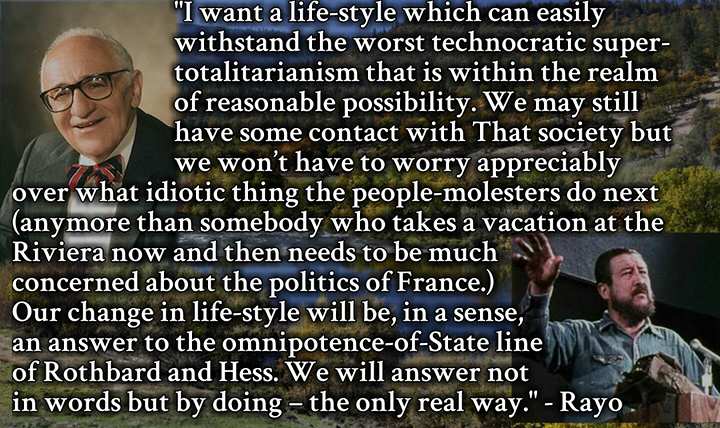
But it’s important to keep in mind that vonu is truly yours for the making, as everyone’s path to liberation is wholly unique and the strategy will necessarily evolve over time. The threats/coercion faced today are at least a little different than in the 1950’s, and likely even more distinct when compared to the 1800s. So, it’s a very dynamic, flexible, and adaptable freedom strategy, and as Rayo pointed out, even in a post-government society, vonu will still be necessary, as a post-coercion world is seemingly a utopian fantasy.
The final reason I’ll mention as to vonu’s importance today is that it’s a very objective approach to freedom, unlike many others. If the lifestyle change you adopt makes you more invulnerable to coercion, then it’s in line with vonu. And Rayo even came up with a metric for measuring it called “Mean-Time to Harassment”. The idea is, the longer in between interactions with coercers (i.e. bludgies/police, a “contact tracer”, pharmaceutical representative, etc.), the higher the mean-time to harassment.
Check out the chart below for a visual representation of the concept, or this episode of The Vonu Podcast, wherein we covered it more in-depth.
~~~
ETHICAL ENCLAVE TRADING: The Precursor to Agorism
In November 1965, when Samuel Edward Konkin III (SEK3) would have been 18 years old, Rayo published an article in Innovator titled, Self-Seeking: Ethical Enclave (Black Markets). He defined this concept as:
voluntary transactions between individuals who are living under a collectivist government, when such transactions are conducted independent of that government. ‘Ethical’ denotes the distinguishing characteristic of the participating individuals: an adherence to the ethical principle of voluntarism…And ‘enclave’ denotes physical emersion within a philosophically alien society.
He makes an even further distinction between black (1) and grey (2) markets:
An ethical enclave, by existing within the territorial domain of a coercive government is either legal – utilizing ‘interstices’ (2) in the taxes and regulations of that government, or illegal – operating despite threats of violence (1).
Sounds awfully similar to agorism, huh? Well it is, and there are only a couple of, really, minor differences between them.
First off, ethical enclave trading is merely an option for vonuans – one strategy of many in the tool belt – whereas, if you don’t practice black/grey market trading, you aren’t an agorist. Put another way, in a statist society, everyone is a counter-economist, but not everyone is an agorist…the necessary duality of philosophy/practice being shared by both of these liberation visionaries.
Secondly, in the Agorist Gameplan laid out by Konkin, the goal was: starve the State, then smash it. It’s more of an offensive strategy; on the other hand, as Rayo explained, vonuans understand that as long as a culture that encourages the growth of the servile society exists, the State will exist. So, it’s a way of learning methods of co-existing with the coercers in the here and now, or as the tagline in VonuLife read:
how to live and let live, out of sight and mind of those unwilling to let live, by people who are doing it
Konkin even mentioned Rayo and vonu in at least a handful of publications which can be found here. So, Konkin was familiar – could he have drawn inspiration from Rayo’s concept of ethical enclaves? It’s certainly possible.
~~~
FREQUENTLY ASKED QUESTIONS (OR COMMON CONFUSIONS)
Q: Does vonu support electoral campaigns?
A: No, because such activity is considered to be political crusading, which is the vernacular term for reformism; that is, working inside of the system in order to change it from within. Anyone who truly understands the anatomy of the State knows it is doomed to fail before you even begin.
Further, privacy and security culture are critical to vonu, both of which are not to be found within these privacy-unfriendly systems.
Q: Where can I go to join the vonu movement?
A: As a matter of principle, vonu is against collective movementism, and as such, cannot be classified as a social “movement” of any kind. Cultural bowel movements are designed to fail, simply because as “critical mass” becomes closer to being achieved, the integrity of any movement’s ideological principles are diluted into nothingness. Let’s just say the winds of political expediency are bent by gurus and “leaders” who seek to exercise power over others by selling out their own followers for the sake of merging with the power establishment in order to accomplish their “new” goals; all you need to do to prove the existence of disingenuous activists is to study history.
Rather, the main driving idea behind vonu is individual vonu home bases and a “common” agora or ethical enclave; a best of both worlds, I guess you could say. Rayo even went as far as recommending keeping vonu home base location withheld from traders/associates, but that doesn’t work very well for, say, off-grid intentional community projects. Calculated risks, according to the mean-time to harassment.
Q: Aren’t you guys (vonuans/vonuists) just preppers & survivalists?
A: No, because although we do use many of the same methods (food & water storage, bug out bags, firearms battery, strategic relocation, etc.), our motivations and perspectives are vastly dissimilar. Unfortunately, retreaters of all kinds are usually driven by a sense of impending catastrophe, hence the emergence of “doom porn.” As self-liberators, we are more concerned about living freedom in the here and now, regardless of whether predicted doomsdays happen to occur or not.
Q: Why are vonuans unsupportive of both limited government advocates (“minarchists”) and propertarian anarchists (“ancaps”)?
A: Minarchists and AnCaps believe in utopias, plain and simple. Whether it be a “constitutional” government or a stateless “society,” both place their faith in the fallacious notion of a “cultural revolution.” Again, this is repackaged collective movementism, and is hardly worth any lengthy explanation, except to say that vonu places no such faith in these things, preferring instead to get with ourselves and each other in order to build our vonuums and vonuist mini-cultures, because that’s what’s actually achievable and realistic not only within one’s lifetime, but also for the foreseeable future.
Put another way, generally speaking, anarcho-capitalism is theoretical; vonu is a combination of both theory/practice, with a heavy emphasis on the latter.
Q: Are vonu shelters a temporary or permanent autonomous zone?
A: Depending on the type of shelter, a vonuum could be either. The mean time to harassment is a vonuan spectrum ranging from a TAZ (summer survival, all weather survival, comfortable home, and small workshop or laboratory) to a PAZ (small manufacturing, light industry, heavy industry). Refer to the MTH chart from above.
Q: Is there any difference between vonuums, the Second Realm, and the agora?
A: Not much, although each term highlights different features. A vonuum is the place or situation of an invulnerability to coercion; the Second Realm is a culture of liberty that occupies its own protected space and implements independent systems of cooperation; and the agora is an open marketplace (presumably, an unlicensed, unregulated, untaxed laissez-faire freed market). Arguably, the Second Realm is the combination of the agora with vonuums, usually in the form of a TAZ; as PAZs, ethical enclaves can be made to facilitate trade while maintaining excellent security culture, whether it be in the form of an intentional community or even a freeport.
In libertarian fiction, examples of these include Aurora (from Alongside Night), Cannoneer’s Farm (from #agora), and the town of Hardyville (from Claire Wolfe’s Hardyville series).
Q: Isn’t the vonu term “servile society” derisive, not unlike calling someone a “sheeple”?
A: Look, it probably is. But personally speaking, I use “servile society” more so as a matter-of-fact, shorthand descriptor. I can’t deny or ignore what I see (servility) when I have to trudge on into the grocery store or local farm supply shop. To do so would be to deny reality, which is just plain unwise.
That said, I definitely don’t encourage or promote division; the more peaceful, non-coercive free souls we have in our ethical enclaves/agoras, the better. We were all at places of unawareness and ignorance at some point and you never know who will be the next one receptive to (y)our message. But until individuals foreswear the use of coercion, they are not permitted in our free zones…lest the free zones cease to exist.
Q: Why did Rayo create “vonu” when liberty, freedom, libertarian, anarcho-capitalism, etc. existed at the time?
A: Briefly put, things like “liberty” and “freedom” mean different things to different people; if you ask a far leftist what “freedom” is, they might say a Universal Basic Income. If you ask a conservative, they’ll likely posit things like 2A or lower extortion (taxes). Clearly, neither of those positions are anywhere close to those who have made it this far in this Vonu Beginner’s Guide…merely changing out the spoiler on the shitbox of slavery and servitude.
See above for explanation on anarcho-capitalism, and the term “libertarian” was bastardized in 1971 when David Nolan politicized it and formed the LP. Also, these widely popularized terms are far more prone to verbicide and carry a lot more negative baggage.
So, vonu then, is an attempt at making a pursuit of freedom more objective: instead of liberty (a general exemption from coercion) or freedom (an absence of coercion), vonu is an invulnerability to coercion.
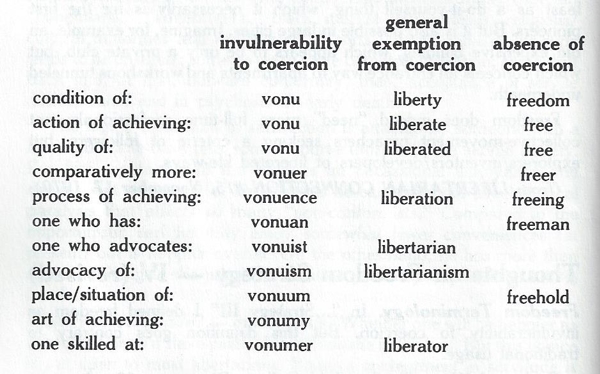
Q: The concept of security culture is closely intertwined with vonu – what is it?
A: Security culture is the direct application of the right to privacy. As a strategy to maintain liberty, it is focused on the how of making privacy happen in the real world, given that the philosophical justification for privacy is self-evident, particularly through argumentation ethics.
[Have additional questions? Send them to [email protected]!]
~~~
NEXT STEPS…
- Subscribe to The Vonu Podcast via RSS or on your favorite podcatcher; that way, you can keep up with the newest developments in the exciting realms of vonu/self-liberation!
- Check out this page for Free Vonu Books! Includes the free PDF/audiobook for Vonu, Book 1 and Vonu, Book 2, as well as many other free books/zines for download.
- Know thyself: figure out where you are at in your pursuit of vonu (or, your untangling from Babylon). Questions to ask: how many ties/connections to the State/servile society do I have? What are the easiest, most painless ones to get rid of? Etc.
- Check out the following resources for inspiration, knowledge, and networking:
- FreedomCells.org (for connecting with like-minded folks locally)
- IC.org (Intentional Community directory)
- PAZNIA.com (a potential model for a self-sufficient Second Realm network)
- Agorist.Market (a network of agorist businesses, hustles, etc.)
- Agorist.Nexus (directory/networking, podcasts, articles, & more)
- Building The Second Realm (episode series listing & links)
~~~
THE FINISHING TOUCHES…
And there you have it!
The philosophy, history, and an overall introduction to the liberating freedom strategy of vonu. After you determine where you’re at in your journey, identify what’s important to you, what lifestyles you know (or believe) you would enjoy & could achieve, and start taking steps towards a life of independence from coercive influences in both the public and private spheres. This guide will indeed assist you on your path, but always keep in mind…
Vonu is yours for the making.
Want to learn more about this liberating freedom strategy of vonu?!
Get The Vonu Bundle, exclusively from our partners at Liberty Under Attack Publications!
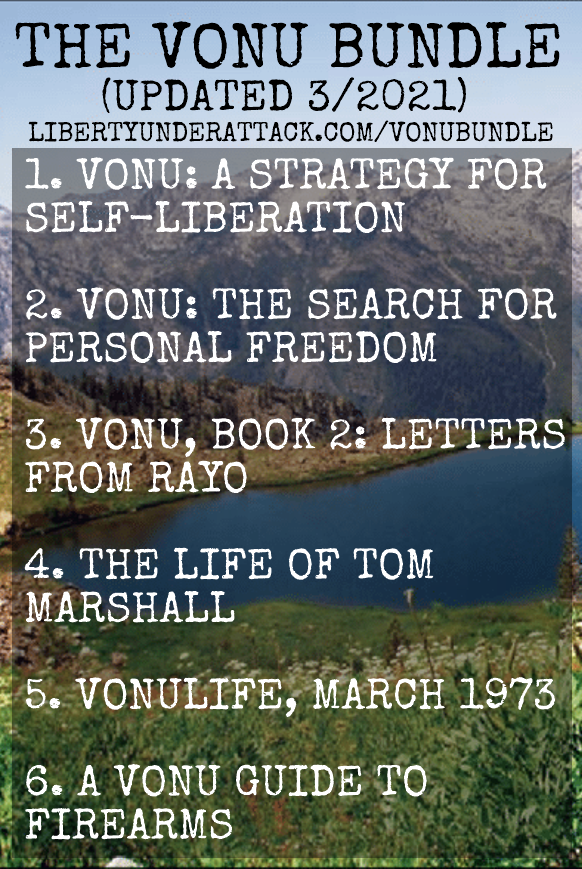
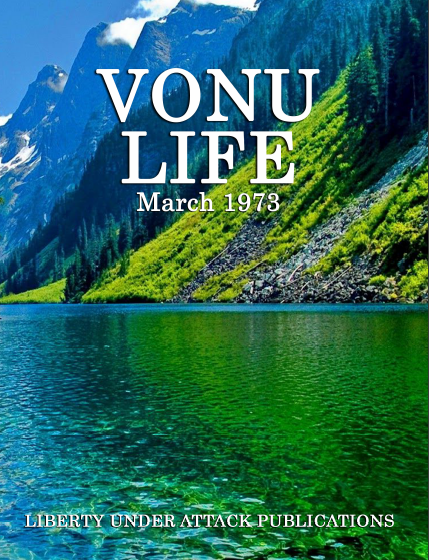
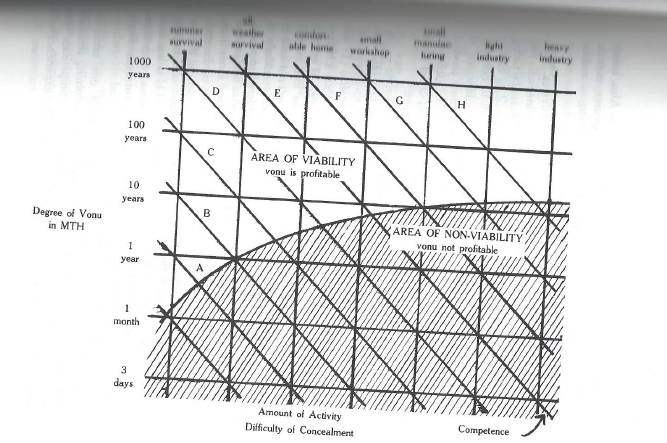
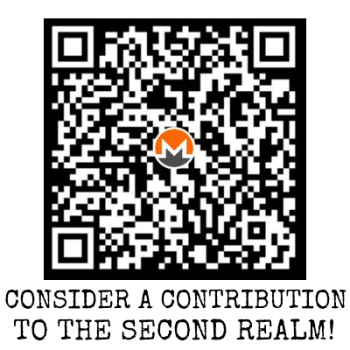
One Reply to “TVP #109: The Ultimate Vonu Beginner’s Guide [For Agorists & Beyond!]”